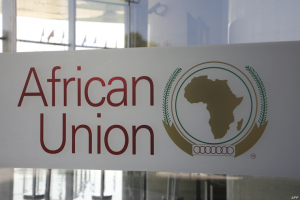Guinea: Is There a Future for Guinea’s Press? Not Without the Country’s Banned Media Outlets

Guinea’s media regulator just concluded the “Forum on the Future of the Press,” an event dedicated to rebuilding the country’s media landscape, yet six iconic news outlets remain blocked. Four private radio stations and two private television channels have been banned from broadcasting for a year, drastically restricting the population’s access to diverse sources of information. Reporters Without Borders (RSF) calls for their reinstatement: the future of Guinea’s media cannot be envisioned without their return and with no economic plan to support the weakened media ecosystem.
It has now been a year since the Guinean population lost access to the television and radio stations Djoma TV, Djoma FM, Espace FM, Espace TV, Sweet FM, and FIM FM. On 21 May 2024, the private media outlets had their operating licenses revoked by the authorities. The following day, the Post and Telecommunications Regulatory Authority (ARPT) requested their frequencies to be revoked and their facilities dismantled. The government justified this censorship by arguing that “certain media outlets were failing in their responsibilities.” During the six months preceding this decision, the four radio stations, all of which relayed the news in an outspoken tone, had been subjected to constant interference .
One year later, these outlets have still not been able to resume operations. More than 800 journalists were forced out of work overnight.
This sad anniversary comes the day after the Forum on the Future of the Press in Guinea organised by the High Authority for Communication (HAC), which aimed to bring together industry stakeholders to reflect on the challenges facing journalism in the country. During the Forum, Prime Minister Amadou Oury Bah addressed the tensions between the press and the government: “It’s been almost a year to the day since we divorced,” he declared, while expressing his desire to “create new dynamics,” carefully avoiding the issue of media restoration. Boubacar Yacine Diallo, president of the HAC, called for a “rebirth of the free and responsible press,” without mentioning the blocked media. It was the HAC that initiated the removal of Espace TV and Djoma TV from television packages for reasons of “national security” before they were officially banned.
“One year after banning six radio stations and television channels, it is time for the authorities to fully assess the impact of this decision on press freedom and journalism. The illegally banned broadcasters have left behind a profound media vacuum, depriving the country of true media pluralism and silencing dissenting voices in what was once a rich and dynamic news landscape. As the Forum on the Future of the Press — organised almost a year to the day after this wave of censorship — draws to a close, the authorities cannot ignore the essential role of these outlets in relaying reliable information, which is a public service. There can be no talk of a ‘rebirth of the free press’ while ratifying ‘a divorce that has been going on for over a year’ with the media. The reinstatement of these outlets is imperative and must be accompanied by a concrete action plan, including financial compensation that matches the heavy losses suffered.”
Sadibou Marong, Director of RSF’s Sub-Saharan Africa bureau
The suspension of the six media outlets resulted in the loss of more than 800 jobs in the press sector, and many of these journalists still have not found work. Others have retrained in different fields and no longer want to hear about their former profession. Former Djoma TV presenter and journalist Fatoumata Sadjo Diallo says: “The closure of our media outlet took everything away from us. I had to depend on my family for six months before starting a business. It’s not easy, but I’m fueled by hope.”
A former columnist on an Espace FM talk show, Alphonse Mara chose to develop his communications business, but laments the stigma that prevents him from carrying out his activities due to his former status: “Several entities have terminated their contracts with us or refused to hire us. Companies are wary.” Some have chosen to continue in the media field: Talibé Barry , former director of FIM FM, and Mamadou Dian Baldé , former editorialist and columnist for the same radio station, co-founded the news website allureinfo.net . Still others have chosen to join the ranks of Radiodiffusion Télévision Guinéenne (RTG), whose programming aligns with the government’s political agenda.
Working as a journalist remains difficult in Guinea, where the general administrator of the news website Le Révélateur 224, Habib Marouane Camara , remains missing after his kidnapping by armed men on 3 December 2024.
Out of the 180 countries and territories surveyed in the 2025 RSF World Press Freedom Index , Guinea suffered the biggest decline, dropping 25 places and now ranking 103rd.



